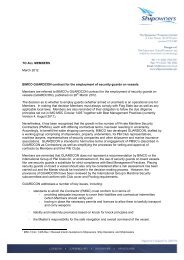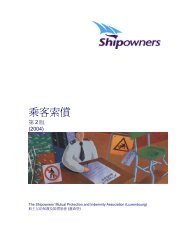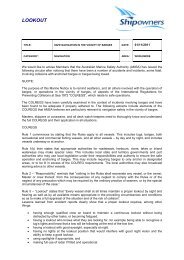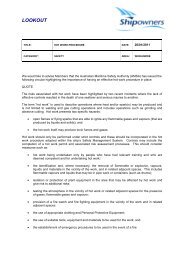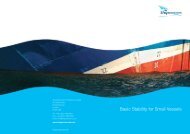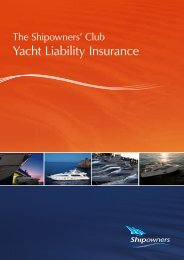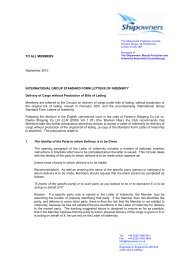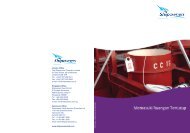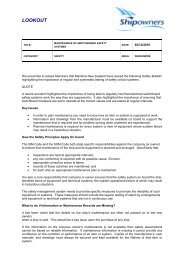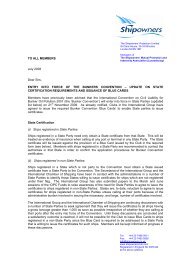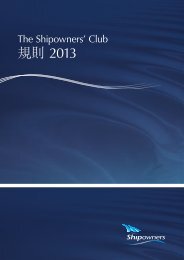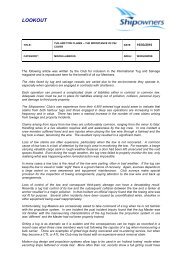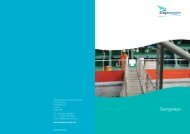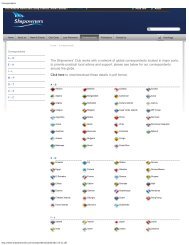Offshore Vessels and Specialist Craft - Shipowners
Offshore Vessels and Specialist Craft - Shipowners
Offshore Vessels and Specialist Craft - Shipowners
- No tags were found...
You also want an ePaper? Increase the reach of your titles
YUMPU automatically turns print PDFs into web optimized ePapers that Google loves.
Contents2 About the Guide5 Club Cover6 Contract Review8 Property Damage11 The Right to Limit Liability12 Mutual Hold Harmless Agreements (“MHH”)13 Personal Injury14 Towage17 Salvage18 <strong>Specialist</strong> Operations19 Pollution20 Cargo21 Wreck Removal23 Waivers of Subrogation, Co-assurance <strong>and</strong> Cross Liability23 Conclusion24 Contact Us
About the GuideThe <strong>Shipowners</strong>’ Club is pleased to provide this updatedguide to additional cover for offshore <strong>and</strong> specialist craft,which we hope will be an easy reference not only foroperators, but also for brokers <strong>and</strong> other advisers.This guide examines the risks faced by operators of offshore supportvessels, dredgers, construction <strong>and</strong> maintenance barges, salvage vessels<strong>and</strong> pipe <strong>and</strong> cable laying vessels. It is intended to help owners identifypotential problem areas when bidding for offshore or specialist contracts,so that an owner <strong>and</strong> his broker can ask the right questions well in advance,enabling us to find the best insurance solutions.The Club recognises that a vessel operator’s top priority is to get vesselson charter <strong>and</strong> keep them working safely, in order to secure a return oninvestment for shareholders.Sometimes advice from third party advisers may contain all sorts of legallanguage <strong>and</strong> restrictions, to the point where operators get frustrated <strong>and</strong>wonder if the advisers really underst<strong>and</strong> their business <strong>and</strong> what they aretrying to achieve. In turn, this can lead to the advice not being followed,which can have disastrous consequences.For this reason, the Club makes every effort to get to know an operator’sbusiness so that obstacles can be overcome in the ever-changing world ofoffshore contracts <strong>and</strong> maritime law.
Club CoverAs a member of the International Group of P&I Clubs, which insures over 90% of the world’socean going tonnage, the <strong>Shipowners</strong>’ Club has privileged access to a strong network ofbrokers <strong>and</strong> insurers, allowing us to come up with innovative insurance solutions to meet anowner’s needs.The Rules of the <strong>Shipowners</strong>’ Club are aligned with those of other Clubs in the International Group.Some risks are common across all types of vessel: collision, pollution, personal injury,damage to docks <strong>and</strong> other third party property, for example. These risks are covered bythe Club <strong>and</strong> are set out in Part II of the Club Rules.<strong>Offshore</strong> <strong>and</strong> specialist vessels such as dredgers, vessels engaged in salvage or constructionprojects often operate in a different environment which brings additional risks, not faced by themajority of commercial vessels, where contracts entered into will specify an apportionment ofrisks between operator <strong>and</strong> charterers/contractors.Some risks fall within st<strong>and</strong>ard Club cover <strong>and</strong> some do not. This guide should help operatorsdistinguish between them so that adequate protection through the Club can be put in place.Rule 2, Section 11 sets out the terms of cover for offshore risks. The Club will cover an ownerfor liabilities assumed under contract, so long as the contract apportions liability on the basis ofcommon law or contains a clean “knock for knock” provision, meaning that each party acceptsliability for its own property damage, injuries to its own personnel <strong>and</strong> direct third party liability.Where a contract does not contain such provisions, the Club can work with the owner tosuggest amendments to those terms or, if necessary, put in place insurance cover against thecontractual obligations imposed by such contracts. This cover is referred to as “contractualliability cover”, <strong>and</strong> it can be purchased on a one-off basis or alternatively the Club mayconsider offering it on a blanket “open cover” basis.
Contract Review<strong>Offshore</strong> contracts such as BimcoSupplytime 89 <strong>and</strong> the revised2005 version, as well as Towcon<strong>and</strong> Towhire, include widely drafted“knock for knock” clauses that clearlyapportion liability between operators<strong>and</strong> charterers. This “knock forknock” provision extends to the othercontractors <strong>and</strong> sub-contractors ofthe operator <strong>and</strong> charterers.However, many charterers insist onamending these industry st<strong>and</strong>ardforms, or using their own charterparty forms, <strong>and</strong> these may includeterms <strong>and</strong> conditions that are not“knock for knock”. Charterers’contracts are sometimes draftedby lawyers who have very littleexperience in the real world ofoffshore operations.Charterers are often prepared to listen to a wellreasonedargument on certain points, leading to acontract that, while not perfectly “knock for knock”,is still acceptable to the Club. Where this requires anowner to buy additional contractual liability insurance,it may be possible to adjust the day-rate for thevessel at the contract bidding stage to take account ofsuch premium. After winning a contract, if an ownerdiscovers that it contains wording with exposure touninsured risks, it may be possible to buy additionalinsurance to cover this exposure, though this may bemore expensive.Overall, the review of offshore contracts is very mucha joint venture between the Club, the Member <strong>and</strong> thebroker. This is why the Club should be involved at anearly stage, to help owners identify the problems <strong>and</strong>work around them together.Sometimes charterers amend thewording of their st<strong>and</strong>ard or “lastdone” contracts without drawingattention to the changes. Whatappears to be the same contractas before may in fact contain somenasty surprises.
The Right toLimit LiabilityIn most countries, the applicablemaritime law gives vessel operatorsthe right to limit their liability forproperty damage <strong>and</strong> personalinjury, according to a formula basedon the gross tonnage of the vessel.However different laws apply indifferent countries <strong>and</strong> can beapplied inconsistently.Club cover includes a provisionthat the Club will only reimburseMembers up to the sum to whichthey would have been entitled tolimit liability, under the applicable law(unless of course, in law, the operatorloses his rights to limitation). If acontract provision waives suchstatutory right to limit liability,then Club cover would generallynot reimburse any sum above thelimitation amount.Clause 12(d) of Supplytime 89 <strong>and</strong> Clause 14(d) ofSupplytime 2005 are “right to limit” clauses <strong>and</strong> theirwording should be strictly followed.Charterers will sometimes ask “why should supportvessel operators be entitled to limit liability if they causeUS$20 million in damages?” One answer is that it isbased on the risk / reward ratio - the support vesselmay be earning tens of thous<strong>and</strong>s of dollars per dayagainst hundreds of thous<strong>and</strong>s per day for the rig owner,<strong>and</strong> millions per day for an oil company. Consequentlycharterers, rig operators <strong>and</strong> their insurers can absorblarge losses in contrast to a support vessel operator.Also, the oil company <strong>and</strong> rig owner will already havetheir own insurances, so there is little point in forcingvessel operators to double-insure the risk.If charterers request that the right to limit is waived,this request should be declined. It may be possible toagree to a fixed figure limit <strong>and</strong> buy contractual liabilityinsurance up to that amount. Occasionally this limitwill correspond to the insurance deductible of the oilcompany or rig owner.11
Mutual HoldHarmless Agreements (“MHH”)If the vessel damages the rig in such a case, the vesseloperator could find himself directly liable to the rigowner, not only for the cost of repairs but also for lostrevenue, which could quickly add up to millions of dollars.The Supplytime 89 form contained an MHH inAppendix C. However, the new Supplytime 2005 doesnot have an MHH because the un-amended Clause 14of Supplytime 2005 (Clause 12 of the 89 form) will giveoperators sufficient protection against claims fromother parties working in the field.However, in some cases charterers refuse to extendtheir indemnity to include all of their other contractors,sub-contractors <strong>and</strong> / or customers. In such a case,an MHH is still a useful tool to have in place.In a strong exploration market, there have also beencases where drilling rig companies say to oil majors “youare not allowed to indemnify support vessel operatorsagainst damage to our rig - we want to be able to claimfrom them”.For this reason, if a charterer’s “knock for knock”clause does not expressly include his contractors <strong>and</strong>sub-contractors, (including the owners of any rig towhich the vessel is ordered), then charterers shouldbe pressed to agree to an MHH. If they refuse, then itmay be possible to negotiate a fixed limit for rig damage(for example, to a figure equivalent to the rig owner’sdeductible amount), with a full indemnity from rigowners above that amount. The Club could then assistin buying specific insurance cover for this risk.Close attention should be paid to the wording of MHHs,to ensure that they include not only property damagebut also personal injury <strong>and</strong> consequential damages.In summary, all contracts should contain a carefullyworded indemnity in respect of charterers’ property,<strong>and</strong> also in respect of the property of their contractors<strong>and</strong> sub-contractors. If they do not, then ideally anMHH should be put in place.12
TowageRule 2, Section 10 of the ClubRules states that the Club will coverliability arising out of towage bythe vessel, but only if such towageis carried out in accordance withapproved industry contracts such asthe UK, Netherl<strong>and</strong>s, Sc<strong>and</strong>inavianor German st<strong>and</strong>ard towageconditions; Lloyd’s St<strong>and</strong>ard Formof Salvage Agreement (“LOF”);Towcon or Towhire.Where any other towage contractis used, it should include a “knockfor knock” clause covering theobject towed <strong>and</strong> cargo onboard or associated with it, aswell as personal injury, deathof charterers’ (the “hirers”)personnel <strong>and</strong> also third partyliabilities arising out of the tow.In many cases, especially workingin oil fields, there will be no directcontract between the vessel <strong>and</strong> theobject towed. Care should be takento ensure that all objects towedby the vessel are covered underthe “knock for knock” provisionsof the contract entered into withthe vessel charterers. This mustinclude an indemnity in respect of allproperty <strong>and</strong> people of charterers’contractors <strong>and</strong> sub-contractors.In FPSO <strong>and</strong> vessel berthingoperations, the contract shouldinclude a clause stating that alltowage shall be performed eitheron terms such as UK, Netherl<strong>and</strong>s,Sc<strong>and</strong>inavian or German st<strong>and</strong>ardtowing conditions, or on “knock forknock” terms. The clause shouldinclude an indemnity from thecharterers in case the owners of thetowed object, or third parties, bringclaims directly against the towingvessel as a result of the towage.14
SalvageIf a vessel performs salvage duties to save life at sea, then normal Club cover remains inplace. However, Part V, Rule 28 states that there shall be no recovery from the Club wherethe activity of specialist vessels “intended for salvage operations”, causes claims duringsalvage operations. Most offshore vessels <strong>and</strong> many harbour tugs are capable of carryingout salvage duties <strong>and</strong> have equipment fitted to perform such activities. It is important tolet the Club know in advance if any vessels are deemed specialist salvage vessels, engagedsolely in salvage activities.Rule 4 sets out the cover available for such specialist salvage vessels, upon prior agreementby the Club. In brief, this reinstates st<strong>and</strong>ard Club cover during the salvage operation <strong>and</strong> alsocovers oil pollution from the vessel being salvaged, as well as covering third party liabilitiesarising out of salvage operations.This cover will have its own limits <strong>and</strong> an additional premium may be required, especially ifcover is requested to cover the actual third party liabilities arising from a salvage operation.<strong>Offshore</strong> contracts often require operators to provide salvage services to vessels <strong>and</strong>equipment belonging to charterers <strong>and</strong> their contractors, <strong>and</strong> that operators waive any claimfor salvage so that such services will be provided for no payment, other than the daily hire.Clauses 15(c) of Supplytime 89 <strong>and</strong> 18(c) of the 2005 form contain important protection foroperators in such circumstances.17
<strong>Specialist</strong> OperationsCertain operations carried outby vessels can be so unusual thatthe risks associated with them falloutside st<strong>and</strong>ard P&I Club cover.These operations are known as“specialist operations” <strong>and</strong> they areset out in Rule 28. These include, forexample, dredging, cable or pipelaying,construction or maintenancework <strong>and</strong> professional oil pollutionresponse duties. However, due tothe ever-changing technology ofoffshore operations, this definition isa guide only <strong>and</strong> not a definitive list.St<strong>and</strong>ard P&I risks such as personalinjury, pollution or collision remainfully covered during such specialistoperations. What is not covered areclaims related to the special natureof the operations, or loss of ordamage to the plant or equipmenton which the specialist operationsare being performed. For example,if a cable-laying vessel has a collisionwhile laying a cable, that liabilitywould still be covered in the normalway because the collision did notresult from the specialised natureof the operations. However, if thevessel causes damage to the cable,liability would not be covered byst<strong>and</strong>ard P&I Club cover.The Club can provide special coverfor the liabilities arising out ofspecialist operations, for examplethe liability to third parties arisingduring a dredging operation in theevent that the dredge snaggeda third party cable during anoperation. <strong>Specialist</strong> operationscan also extend to the activitiesof commercial divers or remotelyoperated vehicles (ROVs) operatingfrom an offshore vessel.Sometimes it may not be clearwhether a vessel is engaged inspecialist operations or not. If in anydoubt it is wise to check with theClub for clarification.18
Pollution<strong>Vessels</strong> operating in <strong>and</strong> aroundoil fields are exposed to manypotential pollution risks.A vessel may collide with platforms,“live” risers or FPSOs, or might dragan anchor over any number of subseastructures, including pipelines,all of which may result in seriouspollution. St<strong>and</strong>ard P&I will coverpollution from third party property<strong>and</strong> vessels, provided the vessel isliable under common law. However,the unique physical <strong>and</strong> contractualconditions in <strong>and</strong> around oil fieldsmean that special care should betaken to address pollution liability.Once again, Supplytime containsa model pollution clause at Clause13 in the 89 form <strong>and</strong> Clause 15in the 2005 form. This apportionspollution liability so that operatorsaccept liability for pollution fromtheir own vessel (except fromcargo) <strong>and</strong> charterers accept liabilityfor pollution arising from all othersources, even if this is caused by theact, neglect or default of operators.Charterers will often try to deletethe last few words “even if...” butthis should be resisted.A further point to consider isthat operators often have to relyon charterers to provide a “fieldchart” showing the location ofpipelines, risers, pipeline manifolds,etc. However, the charter partyusually contains a clause statingthat charterers accept no liabilitywhatsoever for the accuracy of suchinformation. This means the onusrests with the Master <strong>and</strong> operatorto ensure the safety of all anchoringor mooring locations.19
Cargo<strong>Offshore</strong> <strong>and</strong> specialist craft cancarry some very expensive itemsof cargo <strong>and</strong> / or property. It isimportant to ensure that contractsare properly drafted to indemnifythe operator from loss of or damageto cargo <strong>and</strong> / or property, nomatter who owns it.Some contracts are silent on cargoliabilities, but elsewhere there maybe an “owner to provide” clause,which makes the Master responsiblefor lashing cargo. In the absence ofa clear reference to “cargo” in theindemnity clause, this could leaveoperators facing a large claim for anitem of cargo lost overboard.Charterers may ask Masters tocarry “items of equipment” fromone country to another nearbycountry, for delivery to one of thecharterer’s other subsidiaries or toa third party. An example would befrom Nigeria to Equatorial Guineaor Angola. This may seem perfectlyinnocent, but in the eyes of localcustoms officials, this equipment is“cargo” <strong>and</strong> all customs formalities,including form-filling <strong>and</strong> payment ofduty, must be strictly complied with,otherwise the authorities could takeaction against the carrying vessel.In summary, it is importantthat contracts include a clauseindemnifying operators from“all costs <strong>and</strong> consequences”of carrying cargo.20
Wreck RemovalThe Club covers, in Rule 2, Section 12, liabilitiesrelating to the wreck of an entered vessel, including theremoval, lighting <strong>and</strong> marking of such wreck, but onlywhere this is required by applicable law.In most cases, charterers’ wreck removal clauses willrequire operators to remove a wreck <strong>and</strong> / or cargodropped from a vessel if such removal is “deemednecessary” by charterers or their clients. This wordingcould potentially enable charterers to call upon theoperator to carry out very expensive wreck removaloperations, even where the wreck does not pose anyreal threat to sub-sea equipment.In certain countries, local authorities may ask anoperator to “sign over” his interest in a wreck to a localauthority or company. If this is proposed, it is importantto take proper legal advice before agreeing.A contractual extension can be arranged when acontract requires an operator to provide a wreckremoval contractual provision.21
Waivers of Subrogation,Co-assurance <strong>and</strong> Cross LiabilityCharterers will often ask operators to provide awaiver of subrogation from their insurers in favourof charterers <strong>and</strong> their contractors, <strong>and</strong> that thosepersons be named as “co-assured” or “joint assured”on the operator’s insurances.These requests may seem routine, but there areimportant points to consider. Firstly, sometimes thoserequesting to be named as a co-assured are not surewhat they are asking for when making the request.This can cause confusion.The Club can only offer co-assurance on a “misdirectedarrow” basis, meaning the Club can name charterersas a co-insured, but this will only protect them againstclaims brought against the charterers, where suchclaims should have been brought against the vesselowner. An example could be where a member of thevessel’s crew decides to sue the charterers becausethey are a well-known oil major.Charterers may think that, by beingnamed / waived on an owner’sinsurance, this reduces the needto buy their own insurance.This is incorrect <strong>and</strong> charterersshould be reminded that they willneed to arrange insurance for theirown insurable interests.Charterers often request that anowner’s insurance includes a “crossliabilityclause”. Once again, thisconcept is widely misunderstood<strong>and</strong> the simple answer is that theClub can only cover charterers onthe above “misdirected” arrowbasis, <strong>and</strong> cannot provide such“cross-liability” clauses.ConclusionWe hope that this guide will assist Members <strong>and</strong> their brokers to identify the risks inherent inoffshore operations <strong>and</strong> contracts. It is our firm belief that early consultation with the Club willenable us to provide the guidance <strong>and</strong> tools necessary to come up with workable solutions tosuch risks.23
Contact UsLondon Office - Directors & ManagersCharles HumeChief ExecutiveEmail: charles.hume@shipowners.co.ukRalph CotonBusiness Services DirectorEmail: ralph.coton@shipowners.co.ukDavid ReesUnderwriting Department ManagerEmail: david.rees@shipowners.co.ukDavid HeaseldenLoss Prevention ManagerEmail: david.heaselden@shipowners.co.ukSimon SwallowCommercial DirectorEmail: simon.swallow@shipowners.co.ukSteve R<strong>and</strong>allSenior Underwriter & Business Development ManagerEmail: steve.r<strong>and</strong>all@shipowners.co.ukIan EdwardsUnderwriting Service Development ManagerEmail: ian.edwards@shipowners.co.ukBritt PickeringClaims ManagerEmail: britt.pickering@shipowners.co.ukThe <strong>Shipowners</strong>’ Protection LimitedSt Clare House, 30-33 Minories,London EC3N 1BPTel: +44 (0) 207 488 0911Fax: +44 (0) 207 480 5806Email: info@shipowners.co.ukwww.shipownersclub.comVancouver OfficeFrancis FyfePresidentEmail: francis.fyfe@shipownersclub.caWaterborne Underwriting Services Limited1157 - 409 Granville StreetVancouver BCV6C 1T2CanadaRosemary AdamsSenior UnderwriterEmail: rosemary.adams@shipownersclub.caTel: 001 604 681 5999Fax: 001 604 681 394624
The <strong>Shipowners</strong>’ Protection LimitedSt Clare House, 30-33 Minories, London EC3N 1BPTel: +44 (0)20 7488 0911 Fax: +44 (0)20 7480 5806Email: info@shipowners.co.ukwww.shipownersclub.comOctober 2008



